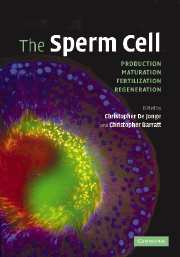Book contents
- Frontmatter
- Contents
- Preface
- List of contributors
- 1 Mammalian spermatogenesis and sperm structure: anatomical and compartmental analysis
- 2 Sperm chromatin stability and susceptibility to damage in relation to its structure
- 3 Genomic and proteomic approaches to defining sperm production and function
- 4 Sperm maturation in the human epididymis
- 5 Controls of sperm motility
- 6 Regulation of capacitation
- 7 Reactive oxygen species: friend or foe
- 8 Testing sperm manufacturing quality: the sperm–zona binding assay
- 9 Genetics: a basic science perspective
- 10 Sex chromosome abnormalities and male infertility: a clinical perspective
- 11 Epigenetic patterning in male germ cells: importance of DNA methylation to progeny outcome
- 12 The DAZ gene family and human germ cell development from embryonic stem cells
- Index
11 - Epigenetic patterning in male germ cells: importance of DNA methylation to progeny outcome
Published online by Cambridge University Press: 14 August 2009
- Frontmatter
- Contents
- Preface
- List of contributors
- 1 Mammalian spermatogenesis and sperm structure: anatomical and compartmental analysis
- 2 Sperm chromatin stability and susceptibility to damage in relation to its structure
- 3 Genomic and proteomic approaches to defining sperm production and function
- 4 Sperm maturation in the human epididymis
- 5 Controls of sperm motility
- 6 Regulation of capacitation
- 7 Reactive oxygen species: friend or foe
- 8 Testing sperm manufacturing quality: the sperm–zona binding assay
- 9 Genetics: a basic science perspective
- 10 Sex chromosome abnormalities and male infertility: a clinical perspective
- 11 Epigenetic patterning in male germ cells: importance of DNA methylation to progeny outcome
- 12 The DAZ gene family and human germ cell development from embryonic stem cells
- Index
Summary
Epigenetics refers to non-sequence based mechanisms that control gene expression and has been described as the next ‘frontier’ in genetics. This chapter focuses on DNA methylation, one of the best-characterized DNA modifications associated with the modulation of gene activity. In humans, DNA methylation abnormalities have been linked to infertility, imprinting disorders in children and cancer. Recent studies have suggested that assisted reproductive technologies (ARTs) may be associated with an increased incidence of epigenetic defects in children and it is unclear whether the etiology is related to infertility with an underlying epigenetic cause or the specific techniques used. Gametes may be particularly vulnerable to epigenetic defects since genome-wide epigenetic methylation patterns are first initiated in the male and female germ lines; the acquisition of gametic methylation patterns is subsequently essential for normal embryonic development. Here, recent progress in our understanding of when and how methylation patterns are established in the male germ line, as well as the enzymes involved in this process, will be discussed. We will also review the factors involved in modulating DNA methylation and the disorders associated with DNA methylation abnormalities in the germ line. Although we will emphasize human studies where they exist, mouse studies will be included since much of our understanding of DNA methylation pattern establishment and propagation comes from studies done in mice.
Epigenetics and gene expression
Epigenetic alterations lead to heritable changes in gene expression without altering the underlying DNA sequence.
- Type
- Chapter
- Information
- The Sperm CellProduction, Maturation, Fertilization, Regeneration, pp. 279 - 322Publisher: Cambridge University PressPrint publication year: 2006
- 8
- Cited by



